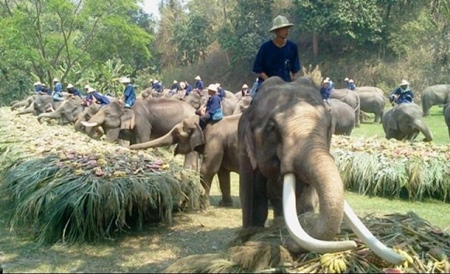BANGKOK, March 28 – Thailand’s Elephant Bill, drafted several years ago, will be revised and submitted to Parliament to protect the diminishing pachyderm population in Thailand, according to a Natural Resources and Environment Ministry official.
Currently elephant affairs are dealt with by four separate laws.

Theerapat Prayurasiddhi, deputy director general of the National Parks, Wildlife and Plant Conservation Department, said the bill is aimed at cracking down on the hunting, smuggling and illegal trade of elephants, and promoting elephants as the kingdom’s national animal.
The legislation will assign the department as the core agency in management of domesticated and wild elephants.
Elephants in Thailand have been under an enforcement net of four separate laws including the Transport Animal Law B.E. 2482 (1939) of the Local Administration Department of the Interior Ministry, the Animals’ Communicable Diseases Law under the Livestock Department, the Wild Animals Conservation and Protection Law B.E. 2535 (1992) under the National Parks, Wildlife and Plant Conservation Department, and a law on trading of elephants tusks under the Commerce Ministry.
Mr Theerapat said the centralisation of elephant supervision concerns to a single ministry, or of as few agencies as possible, will contribute to a clear management and minimise legal loopholes, if not completely eliminating them, in protecting elephants nationwide.
The latest survey found 3,500 domesticated elephants and about 4,000 wild elephants in Thailand.
Sompong Chaisupakosol, director of the Registration Division, Local Administration Department, said a survey issued Dec 27 last year found that 2,978 of the total 3,202 domesticated elephants have been registered with the department and 255 have yet to be registered partly due to their young age.
The original law requires an elephant reaching eight years old to be registered with the Local Administration Department, but the Interior Ministry has revised the ministerial order subjecting owner to have their new-born elephants registered with the authorities.




